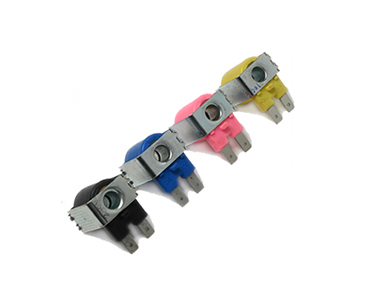
Water Valve Coils
Water Valve Coils


Water Valve Coils are electromagnetic coils used to control the opening and closing of water valves in a variety of systems. These coils are typically part of solenoid valve assemblies, where the coil generates a magnetic field that actuates the valve, allowing water to flow or stop based on the electrical signal provided to the coil. Water valve coils are used in applications ranging from irrigation systems to industrial water treatment, and HVAC systems.
Water Valve Coils are electromagnetic components that generate a magnetic field when energized, which in turn operates the solenoid valve, controlling the flow of water. These coils are usually mounted on a solenoid valve, and when an electric current is passed through the coil, it activates the plunger inside the valve, causing it to open or close. The valve, which regulates the flow of water, can be controlled remotely or automatically, making water valve coils essential for automated water flow control in various systems.
Working Principle
- The principle behind water valve coils is electromagnetic induction. When an electric current is passed through the coil, it generates a magnetic field that pulls or pushes a plunger or valve stem inside the solenoid valve.
- Normally Open (NO): When the coil is energized, it pulls the plunger to close the valve, stopping water flow. When the coil is de-energized, the valve opens, allowing water to flow.
- Normally Closed (NC): When the coil is energized, it pulls the plunger to open the valve, allowing water to flow. When the coil is de-energized, the valve closes, stopping water flow.
Types of Water Valve Coils
- AC Water Valve Coils: These coils are designed for alternating current (AC) applications. They are used in systems where the valve is operated with AC power, such as in some irrigation or water treatment systems.
- DC Water Valve Coils: These coils are designed for direct current (DC) applications, providing more precise control and energy efficiency. They are often used in automated systems where DC power is available.
- Pulse-Operated Coils: These coils are designed to operate on pulses of electricity rather than continuous current. They are often used in systems requiring intermittent valve operation or where precise control over valve position is needed.
Applications of Water Valve Coils
- Irrigation Systems: Water valve coils are used in automatic irrigation systems to control water flow to various parts of a garden, farm, or golf course. Solenoid valves activated by these coils help maintain proper water distribution.
- HVAC Systems: In heating, ventilation, and air conditioning (HVAC) systems, water valve coils are used to control the flow of water in cooling towers, boilers, and heating systems.
- Industrial Water Control: These coils are used in industrial processes such as water treatment, cooling systems, and manufacturing processes, where precise water flow control is required.
- Domestic Water Systems: Water valve coils can be used in household plumbing systems for controlling water supply to appliances such as dishwashers, washing machines, and water dispensers.
- Automated Water Control: In automated systems like smart homes or factory operations, water valve coils enable remote or automated control over water flow, improving efficiency and reducing human intervention.
Key Features and Benefits
- Automated Water Control: Water valve coils enable the automated operation of water flow control systems, reducing the need for manual intervention.
- Energy Efficient: Modern water valve coils, particularly DC versions, are designed to be energy-efficient, consuming minimal power while still providing reliable control.
- Durability: Water valve coils are designed to be durable, even under harsh conditions, and are often built with water-resistant or waterproof materials to ensure long-lasting performance.
- Precise Control: The coils offer precise control over water flow, enabling fine-tuned management of water distribution in various systems.
- Fast Response Time: Water valve coils are known for their quick response times, enabling rapid opening and closing of valves to control water flow efficiently.
